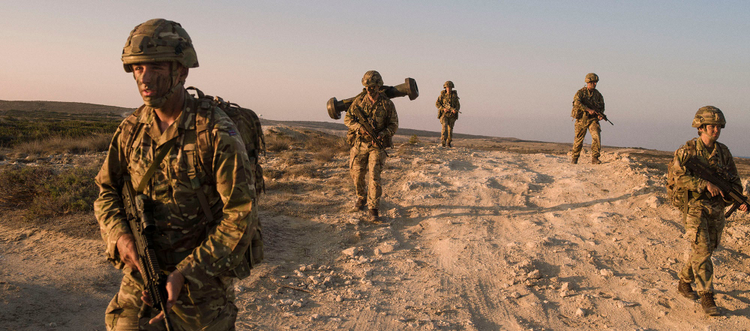British Army Recruitment Targets Not Met Since 2010
The UK’s Ministry of Defence (MoD) has revealed data that shows that British Army recruitment targets have fallen short of expected numbers every year since 2010. The figures show that Basic British Starts (BTS) targets for British Army other ranks were at a shortfall of 22,350 from a 119,530 target from 2010 to 2023.
The figures were gathered at the request of the Shadow Defence Secretary John Healy who asked the current Defence Secretary Grant Shapps to detail the figures recently in parliament. The table below shows the targets and the actual recruitment numbers from the last 13 years.
| Financial Year | BTS Target (OR) | BTS Actuals (OR) | DIFFERENCE |
| 2010-11 | 8,350 | 7,780 | -570 |
| 2011-12 | 10,530 | 10,200 | -330 |
| 2012-13 | 9,830 | 9,440 | -390 |
| 2013-14 | 9,380 | 6,250 | -3,130 |
| 2014-15 | 9,370 | 7,350 | -2,020 |
| 2015-16 | 9,550 | 7,550 | -2,000 |
| 2016-17 | 10,200 | 6,980 | -3,220 |
| 2017-18 | 9,770 | 5,990 | -3,780 |
| 2018-19 | 9,990 | 5,860 | -4,130 |
| 2019-20 | 9,400 | 8,960 | -440 |
| 2020-21* | 8,270 | 8,680 | 410 |
| 2021-22 | 6,670 | 6,580 | -90 |
| 2022-23 | 8,220 | 5,560 | -2,660 |
The data shows the challenges currently facing all three services. James Cartlidge, Minister for Defence Procurement, reiterated the British Government’s commitment to the armed forces recruitment issues on January 8: “we are absolutely committed to supporting defence jobs across the piece. Obviously, we have recruitment challenges.”
This news follows the recent acknowledgement by the MoD that the Royal Navy is facing its own recruitment issues and that figures revealed in December 2023 that the British Army personnel had dropped by over 7,000 over the last year. This points to not only recruitment problems but issues with retention too. When questioned in Parliament by Martin Docherty-Hughe, the Scottish National Party spokesman, Shapps remarked on the Royal Navy’s issues saying “we will be redoubling our efforts to ensure that all of our services can recruit the people that they need.”
In 2019, the British Army and Capita, an outsourcing and professional services company, were criticised for its handling of recruitment. After entering a 10 year deal with the British Army that cost £1.3 billion which saw recruitment figures drop by 21% and 45% throughout the collaboration. One major issue raised by the Public Accounts Committee, which published a report on the deal in 2019, was Capita delivering the Army’s online recruitment website 4 years late. Coating nearly 3 times the original budget at £677 million. The Chair of the Committee made scathing comments regarding Captia’s handling of the deal:
“The Recruiting Partnering Project was intended to meet the Army’s annual recruitment targets and save money in the process. It has failed dismally at the former and has a mountain to climb in order to hit its target for the latter…This is too important to get wrong and we expect the Army to demonstrate it now has a grip on this contract, including what action it is taking when performance falls short.”
The partnership was extended by 2 years in 2020 and will now last until 2024. On top of the recruitment problems faced, new inter-service schemes to boost recruitment have also been launched within the British armed forces. Last November the Royal Navy and Royal Marines were reported to be offering a bounty of £500 to personnel who successfully referred a candidate to the services. A similar initiative was launched by the British Army in the same month offering private ranks £7,500 to transfer into the Parachute Regiment. The bonus is almost one-third of a Private’s annual salary of £23,496. The payment being granted after 3 years of service within the Parachute Regiment, the scheme being expected to swell the ranks of the regiment by 15-20 personnel. Royal Military Academy Sandhurst was also found to be offering officer candidates who did not pass the Army’s selection process first time, a second chance in an effort to retain candidates within the service.

British Army recruitment has seen a shift from their advertisements slogans of the 70s and 80s of ‘The Professionals’ and its ‘Be the Best’ slogan that was first used in 1994. The Army was reported to be dropping the slogan in 2017 as part of a rebrand that cost £520,000 but has since kept the famous tagline after backlash from within the Army itself. A new recruitment campaign was launched in early September 2023 in collaboration with advertising agency Accenture Song with the new tagline ‘You Belong Here’. A series of new TV spots, along with radio, social media and online advertisements, were launched showing British Army personnel helping victims of flooding and evacuating civilians from a war zone. Major General Tom Bewick OBE said of the new campaign:
“Every year our recruitment campaign evolves to address new challenges that create a barrier to recruitment. This year is no different. ‘You Belong Here’ seeks to dispel any doubts that young people may have about fitting in the Army by speaking to how we’re more alike than they think.”

The effects of the new advertisements on recruitment into the Army are currently unknown, posters depicting Army personnel playing football and fighting in a war-torn street attempt to show the duality of service. This is intended to show aspects of both camaraderie and soldiering, something that has always been at the forefront of the British Army’s recruitment drives. However, the new slogan of ‘You Belong Here’, could unintentionally be seen as too forceful by its target audience in contrast to the more aspirational ‘Be the Best’ from the 1990s. It is yet to be seen how the British armed forces will seek to rectify their shortfall in personnel.

